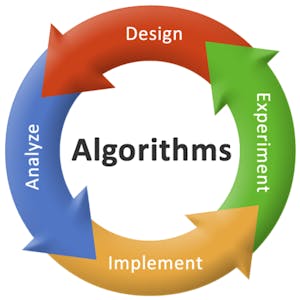Divide and Conquer, Sorting and Searching, and Randomized Algorithms
The primary topics in this part of the specialization are: asymptotic (“Big-oh”) notation, sorting and searching, divide and conquer (master method, integer and matrix multiplication, closest pair), and randomized algorithms (QuickSort, contraction algorithm for min cuts).
None
Syllabus
Syllabus - What you will learn from this course
Week 1
Week 1
Week 2
Week 2
Week 3
Week 3
Week 4
Week 4
FAQ
When will I have access to the lectures and assignments?
Access to lectures and assignments depends on your type of enrollment. If you take a course in audit mode, you will be able to see most course materials for free. To access graded assignments and to earn a Certificate, you will need to purchase the Certificate experience, during or after your audit. If you don't see the audit option:
The course may not offer an audit option. You can try a Free Trial instead, or apply for Financial Aid.
The course may offer 'Full Course, No Certificate' instead. This option lets you see all course materials, submit required assessments, and get a final grade. This also means that you will not be able to purchase a Certificate experience.
What will I get if I subscribe to this Specialization?
When you enroll in the course, you get access to all of the courses in the Specialization, and you earn a certificate when you complete the work. Your electronic Certificate will be added to your Accomplishments page - from there, you can print your Certificate or add it to your LinkedIn profile. If you only want to read and view the course content, you can audit the course for free.
Is financial aid available?
Yes. In select learning programs, you can apply for financial aid or a scholarship if you can’t afford the enrollment fee. If fin aid or scholarship is available for your learning program selection, you’ll find a link to apply on the description page.
Reviews
A bit too heavy on the probability and mathematical proof side, otherwise I learned a lot about divide and conquer algorithms and minimum cut as well as the Master Method for algorithm analysis.
As someone with only (UK) high school level maths I just about managed to follow this. I am still confused by logarithms. I guess I should go and read the maths for computer science resource.
Challenging and eye opening to algorithm design paradigms. As a code writer for data analysis in a scientific field, this course really motivated me to delve deeper in this rich field.
Very good course in algorithms. I bought the book to help me understand but the lectures make it way easier and thus much more fun to understand the analysis. Looking forward to complete the spec
